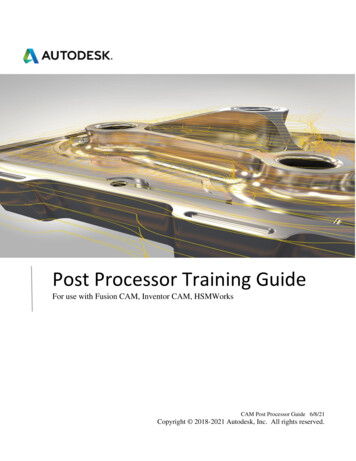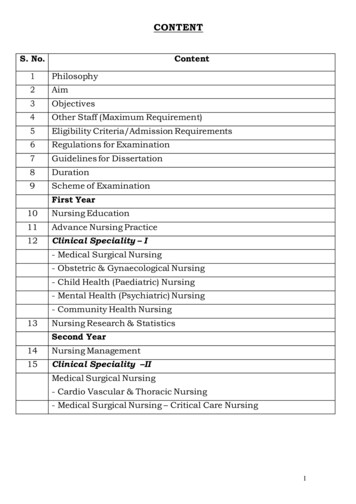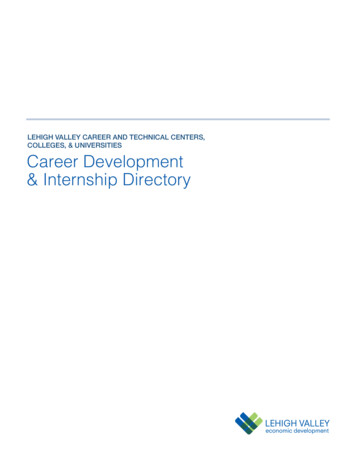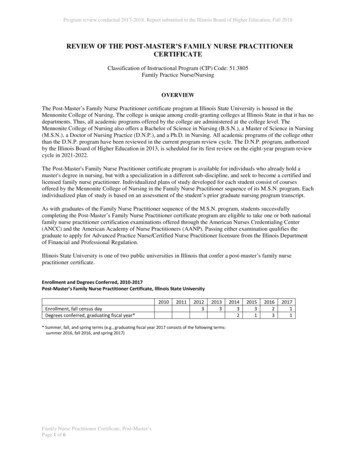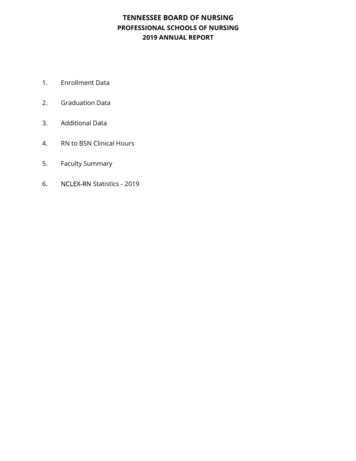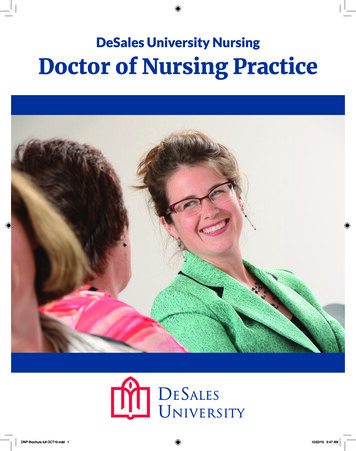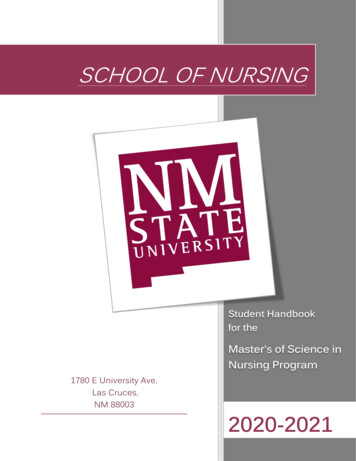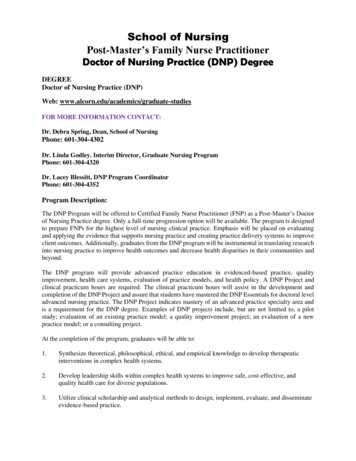
Transcription
School of NursingPost-Master’s Family Nurse PractitionerDoctor of Nursing Practice (DNP) DegreeDEGREEDoctor of Nursing Practice (DNP)Web: www.alcorn.edu/academics/graduate-studiesFOR MORE INFORMATION CONTACT:Dr. Debra Spring, Dean, School of NursingPhone: 601-304-4302Dr. Linda Godley. Interim Director, Graduate Nursing ProgramPhone: 601-304-4320Dr. Lacey Blessitt, DNP Program CoordinatorPhone: 601-304-4352Program Description:The DNP Program will be offered to Certified Family Nurse Practitioner (FNP) as a Post-Master’s Doctorof Nursing Practice degree. Only a full-time progression option will be available. The program is designedto prepare FNPs for the highest level of nursing clinical practice. Emphasis will be placed on evaluatingand applying the evidence that supports nursing practice and creating practice delivery systems to improveclient outcomes. Additionally, graduates from the DNP program will be instrumental in translating researchinto nursing practice to improve health outcomes and decrease health disparities in their communities andbeyond.The DNP program will provide advanced practice education in evidenced-based practice, qualityimprovement, health care systems, evaluation of practice models, and health policy. A DNP Project andclinical practicum hours are required. The clinical practicum hours will assist in the development andcompletion of the DNP Project and assure that students have mastered the DNP Essentials for doctoral leveladvanced nursing practice. The DNP Project indicates mastery of an advanced practice specialty area andis a requirement for the DNP degree. Examples of DNP projects include, but are not limited to, a pilotstudy; evaluation of an existing practice model; a quality improvement project; an evaluation of a newpractice model; or a consulting project.At the completion of the program, graduates will be able to:1.Synthesize theoretical, philosophical, ethical, and empirical knowledge to develop therapeuticinterventions in complex health systems.2.Develop leadership skills within complex health systems to improve safe, cost-effective, andquality health care for diverse populations.3.Utilize clinical scholarship and analytical methods to design, implement, evaluate, and disseminateevidence-based practice.
4.Utilize information systems and patient care technology for the improvement and transformation ofhealth care in diverse populations.5.Provide leadership in the analysis, development, and implementation of health care policy on local,regional, national, and global levels.6.Employ professional/interprofessional communication and collaboration to improve healthcare andhealth care outcomes for diverse populations.7.Evaluate advanced practice care in complex situations and systems to improve healthcare servicesto patients, families, and populations.Application Process (Click Here to Apply)Admission Requirements:The admission committee for the Doctor of Nursing Practice requires the following documents inadmitting students Unconditionally.Unconditional Admission Application – A completed DNP application is required for admission. Official Transcripts – includes official transcripts for all undergraduate and graduate courses.Transcripts must verify that the applicant received a MSN with a specialty as a Family NursePractitioner, from an ACEN or CCNE accredited nursing program.GPA - Applicant must have a minimum 3.0 overall grade point average on a 4.0 scale for the MSNdegree and a grade of “B” or better in a graduate level research course taken within the last fiveyears. The applicant must also verify the number of clinical practicum hours completed in the MSNProgram.Graduate Record Examination - An acceptable Graduate Record Exam (GRE) total score and aminimum analytical writing score of 3.0. is required. Graduate Record Exam scores are valid forfive years. If the applicant has taken the GRE more than one time, the admission committee willuse the highest score to determine eligibility for admission.Letters of Recommendation – Three letters of recommendation are required and must be current( 1 year) and on official letterhead with original signatures from individuals who have personalknowledge of the applicant’s academic and work experience. (Letters: 1 Professional, 1 Academicand 1 Personal).Resume – a current resume is required which describes all work experience and education sincebecoming a registered nurse, detailed in chronological order. The applicant must include in theresume full legal name, address, telephone number, and email address. The resume should be nomore than two pages.Experience – Documentation of a minimum, on current resume, of one year of continuous clinicalnursing experience with patient contact as a RN and/or advanced practice nurse within the pastthree years.Goal Statement – The required goal statement should be a narrative which expounds on howobtaining a DNP from Alcorn State University will help achieve your career path. The contentshould also include reasons for seeking admission to the DNP program, state areas of researchinterest, identify goals while in the program and long-range career goals, explain qualifications andreadiness for the program and mentorship expected by program faculty.Nursing License – Current unrestricted and unencumbered RN and APRN licenses andcertification as a family nurse practitioner in the state of residence in which the individual willcomplete clinical practicums.
Interview – An invitation to an interview is sent to the applicant by the Director of the GraduateNursing Program after a preliminary review of the application. Candidates chosen for the interviewwill receive an email with instructions on how to schedule the interview. Interviews will beconducted electronically.Background Check – All applicants must have a criminal history background check with nodisqualifying events, as mandated by the State of Mississippi.Additional Requirements for International Applicants Credential Evaluation – Evaluation of transcripts by an authorized credentialing service todocument degree is equivalent to a U.S. Bachelor’s Degree.Statement of Finances – Two documents are required to validate student has sufficient funds tosupport study in the United States (Tuition and Fees and Living Expenses). Affidavit of Supportand Bank statement no older than three weeks at time of submission.TOEFL for International Applicants - The Test of English as a Foreign Language (TOEFL) isrequired for all applicants who are not citizens of the United States, including permanent residentapplicants who hold a green card and international applicants currently in the United States on anytype of VISA.Tuberculosis Screening – Chest X-Ray and Blood Test are required which cannot be older thansix-weeks at time of submission. Applicant must take qualifying tests after arrival in the UnitedStates.Progression RequirementsA grade point average of 3.0 is required for continued study in the DNP program. Grades below B are notacceptable in the DNP program. Students that receive a grade below B in any course are subject to dismissalfrom the program.Degree CompletionTo qualify for conferring of the Doctor of Nursing Practice degree, a student must complete the 36 creditsoutlined in the DNP Plan of Study with a minimum grade point average of 3.0 on a 4.0 scale. Included inthe 36 credits is the DNP Project, which must be implemented, evaluated, and presented orally to thestudent’s Advisory Committee, School of Nursing administration, and a representative for GraduateStudies. A customized checklist of requirements is provided for each degree plan in go.alcorn.edu to informstudents of specific requirements related to their academic curriculum.CurriculumThe curriculum for the Post-Master’s DNP Program will require 36 semester credit hours to be completedin five (5) semesters of continuous enrollment. These hours will be broken down into specialty-focusedcontent and doctoral education essentials which include the following areas: scientific underpinnings;organizational and systems leadership; clinical scholarship and analytical methods for evidence-basedpractice; technology; health policy; inter-professional collaboration and population health outcomes;clinical prevention and population health; and advanced nursing practice.The program will be offered primarily in an online format with no more than two face-to-face requirementsper semester. The DNP Program will require 540 practicum hours. An individual gap analysis will becompleted for each student to develop a plan of study to include the required practicum hours. Clinicalpracticums will be included in semesters 2, 3, 4, and 5. The Plan of Study for the DNP Program is outlinedin the Table below:
DNP Plan of StudyCourse #NU 700NU 701NU 702NU 703NU 704NU 710-INU 705NU 710-IINU 706NU 707NU 710-IIINU 708NU 710-IVCourse NameSemester 1 (Fall)Advanced Health InformaticsClinical EpidemiologyHealthcare Quality ImprovementSemester 2 (Spring)Advanced Health Systems, TheoreticalFoundations, and Ethical IssuesPopulation HealthDNP ProjectSemester 3 (Summer)Evidence-Based Practice, Theory, Design, &MethodDNP ProjectSemester 4 (Fall)Leadership in Health SystemsAdvanced Healthcare Policy & PoliticsDNP ProjectSemester 5 (Spring)Business Management in Clinical PracticeDNP 0405180540Course Descriptions:NU 700 – ADVANCED HEALTH INFORMATICS(3 Credit Hours)This course focuses on the collection, organization, analysis, and dissemination of information in nursingand health care. Students are introduced to the specialty of nursing informatics, the information systemlife-cycle, telemedicine, and the use of technology to enhance nursing care delivery and patient safety.Also, students learn how to design, use, and manipulate patient databases for the analysis of patientoutcomes.NU 701 – CLINICAL EPIDEMIOLOGY(3 Credit Hours)This course provides an overview of the basic epidemiological methods as well as study designs that maybe used by advanced practice nurses to study the health of populations. This course will combine a focuson traditional and social epidemiology to examine how society and social organizations influence healthand well-being of individuals and populations, with special attention to rural populations. In particular,this course will address frequency, distribution, surveillance methods, and new applications ofepidemiological methods.
NU 702 – HEALTHCARE QUALITY IMPROVEMENT(3 Credit Hours)This course provides knowledge and skills necessary to critically evaluate existing patient safety policiesand practices. The principles of design, implementation, and evaluation of evidence-based strategies usedto improve practice policies for diverse patient populations in clinic, home, institutional, and communitysettings are explored. Emphasis is placed on identification of critical variables that serve as catalysts forpositive clinical outcomes. Special attention will be given to safety in prescribing and medicationmanagement in nurse practitioner practice at the doctoral level.NU 703 – ADVANCED HEALTH SYSTEMS, THEORETICAL FOUNDATIONS, AND ETHICALISSUES(3 Credit Hours)This course provides the student with the opportunity to analyze ethical theories, and evaluate theapplicability of theories to nursing, health care systems, and health care policies. Emphasis is on reasonedconsiderations of contemporary theoretical perspectives in bioethics. The focus is on theories related torational systems of bioethical problem solving in a culturally pluralistic society. Students are expected toalso explore their professional beliefs and value system. Practical application of nursing, developmental,ethical, family, health and other theories will be examined.NU 704 – POPULATION HEALTH(3 Credit Hours)This online course for the Doctor of Nursing practice program prepares the student to implementpopulation-based disease prevention and health promotion activities to achieve national and internationalgoals of improving worldwide health status. The course focuses on a spectrum of issues affecting health,which include emerging infectious disease, emergency preparedness, disparities in health and healthcareservices, and the impact of behavior and lifestyle choices on health.NU 705 – EVIDENCE-BASED PRACTICE, THEORY, DESIGN, & METHOD(3 Credit Hours)In this course, the students will examine the evidence-based standards for the advanced practice nurse.Students will explore strengths and weaknesses of different research methodologies and types of dataanalyses. Each student will evaluate the status of current research and evidence-based literature pertinentto clinical practice.NU 706 – LEADERSHIP IN HEALTH SYSTEMS(3 Credit Hours)This course focuses on knowledge and skills that are necessary for nursing leaders to effectively managechange, empower others, and influence organizational processes in health care environments. Models andstrategies related to leadership, effective organizational processes, organizational change, conflictmanagement, strategic planning and interprofessional and intraprofessional teamwork will be evaluated.Emphasis is on the development of skills in health system assessment and intervention design.NU 707 – ADVANCED HEALTHCARE POLICY & POLITICS(3 Credit Hours)This course provides knowledge and understanding needed to participate in health policy development,analysis and implementation. The impact of policies on the delivery of health care and nursing serviceswill be explored. The relationship of health policies to the financing of health care will be presented.Students will be introduced to health economics with a focus on the elements of financial management
including the language and basic concepts of cost, the budgeting process and systems of reimbursement.Global, national, state, and local systems of financing health care will be compared.NU 708 – BUSINESS MANAGEMENT IN CLINICAL PRACTICE(3 Credit Hours)This course provides the student with an overview of the principal financial mechanisms in the U.S. healthcare industry and offers specific insights into the critical issues the industry currently faces. A feature ofthis course is the development of practical financial analysis skills that will provide students with afoundation for immediate application within the health care industry. The student will also be providedbest practices for business management of a clinical practice.NU 710-I – DNP PROJECT(1 Credit Hour)This course will assist Doctor of Nursing Practice students in gaining the knowledge, skills, and abilitiesnecessary to develop an evidence-based project proposal and plan, which addresses a practice issueaffecting a chosen microsystem. The purpose of the DNP Project courses is to provide structured didacticcontent and application of the Student’s DNP Project. This is the first of four DNP Project courses that willoccur sequentially and will include 60 DNP clinical practicum hours.NU 710-II – DNP PROJECT(3 Credit Hours)This course will assist Doctor of Nursing Practice students in developing a full proposal that reflectssynthesis of the student’s knowledge from prior coursework and work in an area of interest or expertiseunder the direction of a faculty mentor. The purpose of the DNP Project course series is to providestructured didactic content and application of the student’s DNP Project. This is the second of four DNPProject courses will include 180 DNP clinical practicum hours.NU 710-III – DNP PROJECT(2 Credit Hours)This course will assist Doctor of Nursing Practice students in continued development of knowledge, skills,and abilities to implement the chosen DNP proposal. Students will assume a role of leadership in interprofessional collaboration, consultation, and partnership. Students will receive direction from a facultymentor and peer feedback as they become engaged in the microsystem where they are implementing theirDNP Project. The purpose of the DNP Project courses is to provide structured didactic content andapplication of the student’s DNP Project. This is the third of four DNP Project courses includes 120 DNPclinical practicum hours.NU 710-IV – DNP PROJECT(3 Credit Hours)This course is designed to assist Doctor of Nursing Practice students in the completion of an evidencebased project. Students will complete the implementation phase, evaluate the project, and write the finalDNP project. Students will receive individual direction from a faculty mentor and peer feedback as theywrite the final paper. Students will also be mentored in making professional presentations and writing forpublication. This course is the last of four DNP Project courses and includes 180 hours of clinical practicumhours.
The DNP Program will be offered to Certified Family Nurse Practitioner (FNP) as a Post-Master’s Doctor of Nursing Practice degree. Only a full-time progression option will be available. The program is designed to prepare FNPs for the highest level of nursing
